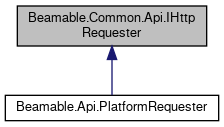Inheritance diagram for Beamable.Common.Api.IHttpRequester:

Public Member Functions | |
| Promise< T > | ManualRequest< T > (Method method, string url, object body=null, Dictionary< string, string > headers=null, string contentType="application/json", Func< string, T > parser=null) |
| Make an HTTP request to any address with no preconfigured authorization More... | |
| string | EscapeURL (string url) |
| A utility method that will url escape a string. More... | |
Member Function Documentation
◆ EscapeURL()
| string Beamable.Common.Api.IHttpRequester.EscapeURL | ( | string | url | ) |
A utility method that will url escape a string.
- Parameters
-
url a url string
- Returns
- the given url string, but with character escaping.
Implemented in Beamable.Api.PlatformRequester.
◆ ManualRequest< T >()
| Promise< T > Beamable.Common.Api.IHttpRequester.ManualRequest< T > | ( | Method | method, |
| string | url, | ||
| object | body = null, |
||
| Dictionary< string, string > | headers = null, |
||
| string | contentType = "application/json", |
||
| Func< string, T > | parser = null |
||
| ) |
Make an HTTP request to any address with no preconfigured authorization
- Parameters
-
method One of the common HTTP methods represented through the Method enum url body The body of the network request. If the type of the body is an object, it will be serialized to JSON. If the type of the body is a string, no serialization will occur. headers A dictionary where the keys are header names, and the values are the header values. contentType A MIME type for the request. For example, "application/json". If the body is serialized to JSON, the contentType will become "application/json" by default. parser By default, the network response will be assumed JSON and deserialized as such. However, if a parser is provided, the network response will be given the parser as a string. The parser can convert the string into the expected result type, T
- Template Parameters
-
T The type of the network response. The network response will be deserialized into an instance of T. You can override the parsing by passing a custom parser
- Returns
- A Promise<T> of type T when the network request completes.
Implemented in Beamable.Api.PlatformRequester.
The documentation for this interface was generated from the following file:
- com.beamable/Common/Runtime/Api/IBeamableRequester.cs